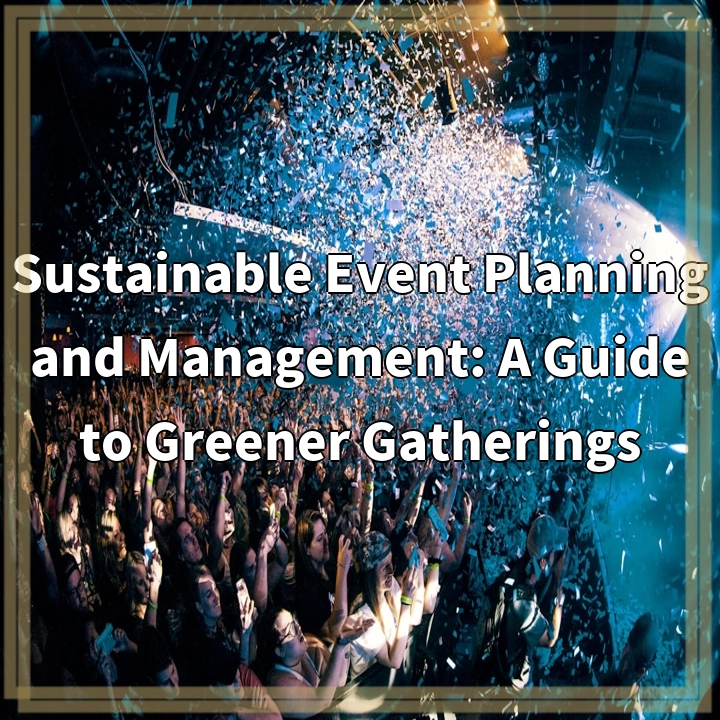
What it is
Sustainable event planning and management refers to the practice of designing, organizing, and implementing events in a way that minimizes their impact on the environment while maximizing social and economic benefits. This involves considering various aspects of event management, including venue selection, resource allocation, waste management, transportation, and community engagement. By integrating sustainable practices, event planners can create memorable experiences that resonate with attendees while promoting ecological responsibility and social awareness.
Core Principles of Sustainable Event Planning
Some key principles of sustainable event planning include:
- Minimizing Waste: Reducing the amount of waste generated during an event through recycling, composting, and the use of digital materials instead of printed ones.
- Eco-friendly Venues: Choosing locations that prioritize sustainability, whether through LEED certification, energy-efficient facilities, or access to public transportation.
- Responsible Sourcing: Working with suppliers and vendors who share sustainable practices, including using locally sourced products and organic catering options.
- Community Engagement: Involving local communities in the planning process and ensuring that events benefit the local economy and culture.
Real-World Problems
Despite the importance of sustainable event planning, several real-world problems hinder its implementation:
Environmental Impact
Traditional events often lead to significant environmental degradation, including excessive carbon emissions due to transportation, high energy consumption, and waste generation. Large gatherings can produce thousands of pounds of waste, much of which ends up in landfills rather than being recycled or composted.
Resource Scarcity
The increasing scarcity of resources such as water, energy, and raw materials poses a challenge for planners aiming to create sustainable events. Events that rely heavily on single-use plastics, non-renewable energy sources, and excessive water consumption exacerbate these issues and contribute to the depletion of vital resources.
Cost Perception
Many planners perceive sustainable event practices as more costly compared to traditional methods. This perception can discourage organizations from implementing sustainable initiatives, despite the potential long-term savings and benefits. For instance, while local sourcing may have a higher upfront cost, it can support local economies and reduce carbon footprints over time.
Lack of Awareness and Education
A general lack of awareness about sustainable practices among event organizers, vendors, and attendees can be a significant barrier to implementation. Many individuals may not fully understand the environmental impact of their choices or may be unaware of the available sustainable alternatives.
Regulatory Challenges
In some regions, existing regulations and permits may not align with sustainable practices. For example, local laws may favor traditional waste disposal methods over composting or recycling, making it difficult for event planners to implement eco-friendly solutions.
In summary
Sustainable event planning and management is an essential approach to reducing the environmental footprint of gatherings while promoting social responsibility. However, overcoming the real-world challenges associated with implementation requires a collaborative effort among planners, vendors, and communities to create a more sustainable future for events.

Solutions for Sustainable Event Planning
Addressing the challenges associated with sustainable event planning involves implementing a range of solutions that promote ecological responsibility while enhancing the overall event experience. Here are some effective strategies to consider:
Adopt Waste Minimization Strategies
To significantly reduce waste generated during events, planners can implement various waste minimization strategies. This includes using digital tickets and programs, providing recycling and composting stations, and opting for reusable or biodegradable materials rather than single-use plastics.
Choose Eco-Friendly Venues
Selecting venues that prioritize sustainability is crucial. Planners should seek out facilities that have sustainability certifications, promote energy efficiency, and utilize renewable energy sources. Additionally, venues close to public transportation can help reduce attendees’ carbon footprints.
Engage in Responsible Sourcing
When sourcing supplies and services, event planners should prioritize local vendors who practice sustainable farming and production methods. This not only helps to support the local economy but also reduces transportation emissions associated with bringing in goods from distant locations.
Raise Awareness and Educate Stakeholders
Creating awareness around sustainable practices among vendors, attendees, and event staff is vital. Workshops, informational sessions, and promotional materials can help educate stakeholders on the importance of sustainability and how their choices impact the environment.
Foster Community Engagement
Involving local communities in the planning and execution of events enhances sustainability efforts. Planners can hold community meetings to gather input and feedback, ensuring that the event meets local needs and preferences while promoting cultural awareness and social responsibility.
Advocate for Regulatory Changes
When faced with regulatory obstacles, event planners can work collaboratively with local authorities to advocate for changes that support sustainable practices. This may involve petitioning for permits that accommodate composting and recycling or encouraging policy shifts that prioritize sustainability in event planning.
In Conclusion
By actively adopting these solutions, event planners can overcome the challenges of sustainable event management and create more environmentally friendly, socially responsible gatherings. The collective effort to promote sustainability not only benefits the planet but also fosters a culture of awareness and responsibility among attendees and stakeholders alike.















